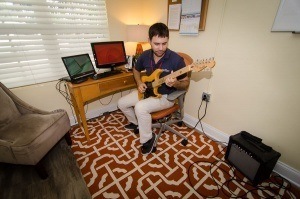Music Therapy
There’s a reason you grab your headphones for a run or crank up your favorite artist on the stereo while cooking: Music makes you feel good. In fact, your brain enjoys it, too, as music can increase dopamine production. That’s why both the soothing and energizing properties make it an ideal modality for addiction recovery therapy.
At Beachside Rehab, music therapy is part of our holistic treatment program. We use it to supplement many of our personalized treatments with the collective goal of increasing your success of recovery and decreasing your risk of relapse.
What Is Music Therapy?
Unlike most other forms of art and communication, music has a very special quality. It can “bypass” our conscious minds and directly access our feelings and subconscious through sound alone. Music is a powerful art form, taking people on an affecting and emotional journey in just a few minutes. While the exact nuances of how and why music affect us so profoundly are still being researched even today, the effects of proper use of music are well documented, and music therapy for substance abuse has been used to great success at many facilities including Beachside.
The essence of music therapy treatment, as it is for any form of addiction treatment, is to find a safe way for people in recovery to express, address and deal with their emotions, especially those emotions that are tied into their addiction. This is part of a holistic recovery process. While it’s true that there is a biological aspect to many substance addictions that causes actual physical withdrawal, cleaning out the system is only one part of a prolonged, multi-tiered campaign against the many factors that caused an addiction to occur in the first place.

Music Therapy for Addiction

When it comes time to treat addiction, music therapy helps you reach down deep to your inner emotions to find ways of expressing, addressing, and dealing with your struggles and triggers.
During music therapy for addiction, you’re able to tap into your creativity, whether it’s through singing a song or reading song lyrics. Regardless of the means in which you express yourself, the end goal is the same: to learn how to cope with your feelings.
In addition to expression, music therapy can also help relieve stress and promote self-awareness and self-expression. It isn’t only for individuals, either. Music therapy in a group setting can give you a sense of community and achievement for learning to work with others.
Types of Music Therapy
In short, music therapy can fall into two buckets: receptive or active.
Receptive music therapy is when you passively listen to or read a song. This could come from a live rendition of a song or a recording. By listening, you allow yourself to focus on the emotional and spiritual meaning of the music.
Active music therapy is when you engage and actively take part in the music. This includes singing or playing an instrument. The act of involving yourself with music allows your creative side to blossom. It’s also a therapeutic way to convey how you feel, either through singing, writing a song, or playing an instrument.
Studies have shown more passive therapies, such as analyzing lyrics, can evoke positive emotional change. More active therapies, such as drumming, can help with relaxation, depression, stress, and anger.
Music Therapy Techniques
Drumming: This is generally done in a group setting and is especially helpful for people who prefer non-verbal communication.
Dancing to Music: Once you listen to music, you’re able to express yourself non-verbally through motion.
Listening to Music: A form of receptive listening, you need to pay close attention to the song’s meaning to convey your thoughts and feelings.
Lyric Discussion: Much like listening to music, discussing song lyrics can help you reflect on certain times in your life that are especially difficult to discuss.
Playing Music: Strumming a guitar or striking piano keys can help convey your mood in a more constructive way than words can.
Singing: This technique is another form of active music therapy, landing somewhere in the middle of the spectrum between non-verbal communication and full-on talk therapy.
Song Writing/Music Composition: Words are powerful and carry deep meaning, even for those who struggle to open up. The same goes for composition. If you’ve watched a movie or television show, you know how the score can evoke certain moods.

Music Therapy Is a Holistic Treatment
Learn more about the holistic treatments we can provide to help treat addiction and the emotional roadblocks that come with it.
From the Blog
Unveiling the Hidden Struggle of High-Functioning Depression
Learn how to understand the signs and struggles of high-functioning depression in yourself or a loved one.
read more




